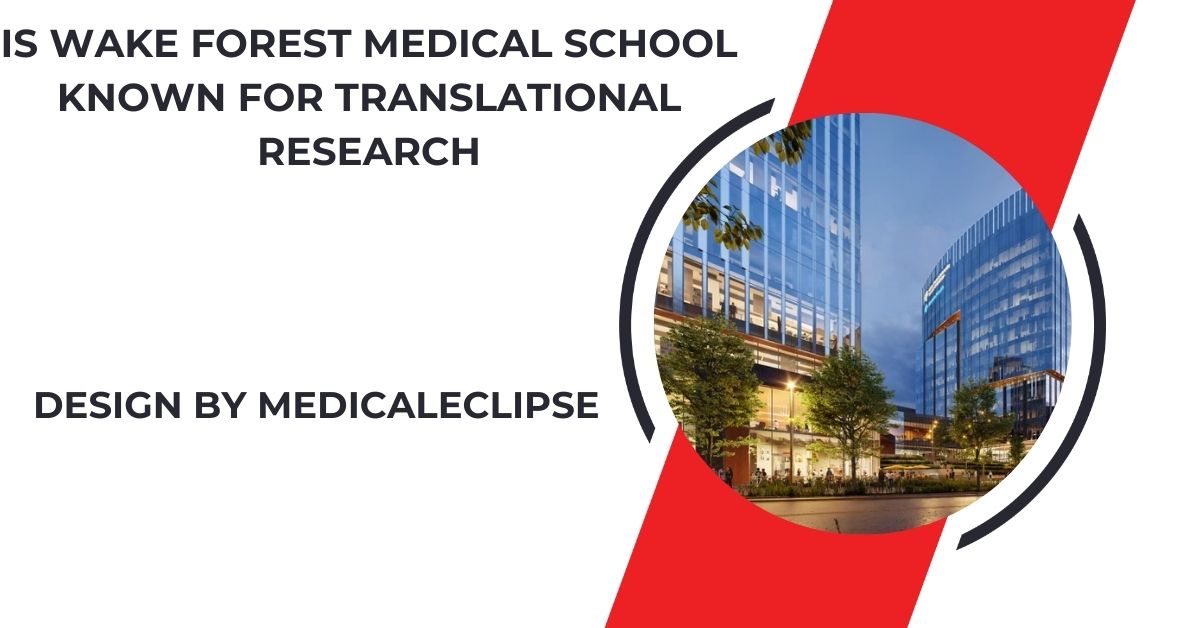Yes, Wake Forest School of Medicine is renowned for its translational research, transforming lab discoveries into effective treatments, especially in regenerative medicine and cancer therapy.
This article explores whether Wake Forest Medical School is known for translational research and what makes it a standout institution in this field.
What Is Translational Research?

Before delving into Wake Forest’s reputation, it’s essential to understand what translational research entails. Translational research is a branch of medical research focused on transforming laboratory discoveries into real-world therapies and treatments. This process moves from “bench to bedside,” where scientific findings are tested in clinical trials, eventually leading to improved treatments, diagnostics, or preventive strategies that directly impact patient care.
Translational research often involves a collaborative effort among clinicians, scientists, and industry partners to ensure that innovations in science can reach patients more efficiently and effectively.
Wake Forest’s Commitment to Translational Research:
Wake Forest School of Medicine has built a solid reputation for translational research, emphasizing innovation and practical applications. The school is home to several interdisciplinary centers and programs that prioritize bridging the gap between scientific discovery and patient treatment.
Here are some ways Wake Forest has distinguished itself in translational research:
Wake Forest Institute for Regenerative Medicine (WFIRM):
- One of the most prominent centers at Wake Forest, the Wake Forest Institute for Regenerative Medicine is a global leader in regenerative medicine and tissue engineering. WFIRM focuses on developing therapies to replace or repair damaged tissues and organs, directly impacting patient care. The institute has pioneered significant advancements, such as lab-grown tissues and organs, to treat injuries and conditions that traditional treatments cannot fully address.
- WFIRM exemplifies translational research by translating laboratory discoveries into clinical solutions, with its breakthroughs reaching patients worldwide.
Also Read: What Is A Medical Pcm – Understanding Medical PCM!
The Clinical and Translational Science Institute (CTSI):
- Wake Forest’s Clinical and Translational Science Institute (CTSI) is a cornerstone of its translational research efforts. CTSI provides researchers with resources, training, and support to translate scientific discoveries into medical advancements. CTSI’s mission aligns perfectly with the goals of translational research, as it accelerates the process of turning laboratory discoveries into treatments that benefit patients directly.
- Through partnerships with health systems, community organizations, and industry, CTSI has advanced research in diverse areas, including cancer, neuroscience, cardiovascular disease, and infectious diseases.
Comprehensive Cancer Center:

- Wake Forest Baptist Comprehensive Cancer Center is one of the only 52 cancer centers designated by the National Cancer Institute (NCI). This distinction highlights the center’s commitment to innovative research that translates into effective cancer treatments.
- The Cancer Center at Wake Forest engages in extensive clinical trials, ensuring that novel cancer treatments are thoroughly tested and accessible to patients. This center has also led in developing personalized cancer treatments that integrate genetic and molecular data for improved outcomes, demonstrating the translational approach in action.
Translational Imaging Program:
- Imaging technology is crucial in modern medicine, not only for diagnosis but also for guiding treatments. Wake Forest’s Translational Imaging Program focuses on developing new imaging techniques and technologies to assist in diagnosing and managing diseases.
- This program’s work is particularly impactful in cancer, neuroscience, and cardiovascular research, where advanced imaging can provide detailed insights that improve treatment precision and effectiveness.
Wake Forest Alzheimer’s Disease Research Center
- Alzheimer’s disease and other dementias are pressing health issues, and Wake Forest’s Alzheimer’s Disease Research Center is dedicated to translating research findings into therapies and strategies to treat or prevent these conditions.
- The center works on identifying early markers of Alzheimer’s, developing cognitive rehabilitation strategies, and exploring potential drugs. Its emphasis on translational research aims to offer concrete, practical benefits for individuals facing neurodegenerative diseases.
Also Read: Medical Device Clinical Affairs Job List – Medical Device Job Roles!
Notable Achievements in Translational Research at Wake Forest
Wake Forest School of Medicine has achieved several milestones in translational research, showcasing its strength in the field:
- Organ and Tissue Engineering Breakthroughs: WFIRM’s work in regenerative medicine has led to the development of bioengineered tissues and organs, some of which have been used in clinical trials to treat patients with organ failure or injuries.
- Innovations in Cancer Therapy: Wake Forest has been at the forefront of precision oncology, developing targeted therapies that minimize the side effects of cancer treatment while maximizing effectiveness.
- Diabetes and Metabolic Disorders Research: The school’s focus on diabetes research has resulted in new approaches to understanding and managing metabolic disorders, including translational research on insulin sensitivity, obesity, and lifestyle interventions.
Why Students and Researchers Are Drawn to Wake Forest for Translational Research
Wake Forest’s reputation in translational research attracts students, faculty, and researchers from across the globe who are eager to make a tangible impact on patient care. The school provides a rich, supportive environment where aspiring medical professionals can actively participate in groundbreaking projects.
Some of the reasons why students and researchers are drawn to Wake Forest include:
- Access to State-of-the-Art Facilities: Wake Forest boasts cutting-edge laboratories and research facilities, which support advanced research initiatives.
- Strong Interdisciplinary Collaboration: The school emphasizes interdisciplinary collaboration, encouraging partnerships across fields to tackle complex medical problems from multiple angles.
- Commitment to Community Health: Wake Forest’s translational research extends to community health initiatives, ensuring that research benefits reach diverse populations, particularly those underserved by traditional healthcare.
FAQ’s
1. What makes Wake Forest School of Medicine known for translational research?
Wake Forest is known for translating lab discoveries into real-world treatments, particularly in regenerative medicine and cancer therapy.
2. What is the Wake Forest Institute for Regenerative Medicine (WFIRM)?
WFIRM is a leading center at Wake Forest focused on developing lab-grown tissues and organs, advancing regenerative medicine.
3. How does the Clinical and Translational Science Institute (CTSI) contribute to research?
CTSI provides resources and support to turn scientific findings into treatments, collaborating on research areas like cancer and cardiovascular disease.
4. What is the focus of the Wake Forest Translational Imaging Program?
This program advances imaging technology for better diagnostics and treatments, especially in cancer, neuroscience, and heart disease.
5. Why do students and researchers choose Wake Forest for translational research?
They are drawn by its advanced facilities, interdisciplinary culture, and focus on impactful, community-centered research.
Conclusion
Wake Forest School of Medicine is a leader in translational research, excelling in regenerative medicine, cancer treatment, and neurodegenerative diseases. Its commitment to turning scientific discoveries into patient-centered solutions showcases its dedication to improving health outcomes. With its innovative programs and collaborative environment, Wake Forest significantly advances medical research, transforming lives and benefiting communities.

Leave a Reply